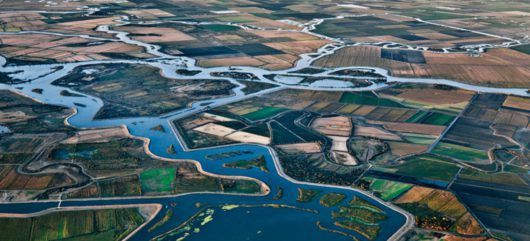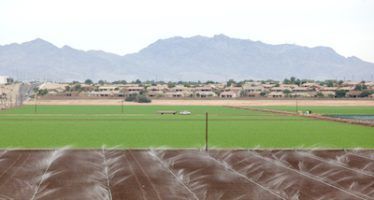Gov. Brown struggles to build support for water project
 Gov. Jerry Brown’s aides treated the release last week of a massive environmental review that marshaled evidence in support of his $15.7 billion plan to build two 35-mile-long tunnels in the Sacramento-San Joaquin Delta as an exciting step toward construction of the far-reaching project.
Gov. Jerry Brown’s aides treated the release last week of a massive environmental review that marshaled evidence in support of his $15.7 billion plan to build two 35-mile-long tunnels in the Sacramento-San Joaquin Delta as an exciting step toward construction of the far-reaching project.
Critics, however, scoffed, saying Brown’s project becomes more unpopular the more it is discussed. In October, when the governor hoped to have consolidated broad support behind the plan, four Northern California members of Congress and eight members of the California Legislature sent letters imploring the federal government to look at what they called fundamental flaws in the project, starting with its shaky financing.
The 90,000-page document hailed by the Brown administration concludes that the two huge tunnels would stabilize statewide water deliveries from the Sacramento River and improve the health of the Delta in a way that was the least problematic of various options now being considered. If approved by state and federal regulators and the Legislature, the project would divert in normal conditions 5 percent more water from the river than is now standard.
The governor told reporters the tunnels had been subject to “more environmental review than any other project in the history of the world.”
Greens, some farmers implacably opposed
Yet even if regulators give their blessing, Brown faces huge political obstacles: While the project has the support of water districts in Southern and Central California and is expected to win support from the business community, politically influential environmentalists have been staunch opponents. They argue that the massive tunnels would actually create new environmental problems, among other criticisms.
The proposal also remains deeply unpopular with Northern California farmers. “We just don’t think that the only answer is to take more water out of a river in crisis,” said Osha Meserve, a Sacramento land-use lawyer working with agriculture and conservation groups, told the Los Angeles Times. Meserve said even if the review was “a million pages,” it couldn’t redeem a bad idea.
The project could also be a tough sell to the public, Sacramento insiders believe — and not just because it would raise water rates statewide. Some Californians unaware of the state’s 160-year history of trying to create a more reliable state water system may see it as a costly overreaction to the drought. Some will look at the highly publicized problems with two other big state projects — the bullet train and the Bay Bridge — and wonder whether the state is up to the challenge of building two massive tunnels.
In May 2015, Brown said critics of his “WaterFix” plan should “shut up” until they were more familiar with it. But in the ensuing 19 months, criticism has only grown as more details are released. Environmentalists think Brown is overselling the benefits of the plan. Many Republicans say the billions would be much better spent on new dams and reservoirs.
It appears the governor will have to do considerable lobbying and arm-twisting — much as he did with Propositions 47 and 57, his two criminal-justice reforms — to line up support in the Legislature. A campaign apparatus — the Californians for Water Security — has been set up to aid his efforts. But as he grows closer to the end of his fourth and final term as governor, his influence seems likely to wane.
Some lawmakers hope to give voters veto power
Meanwhile, a new hurdle looms. A bill with eight co-authors that sought to require a public vote before the tunnels could be built — AB 1713 — passed an Assembly committee on an 8-4 vote early this year only to never be considered again. It is likely to re-emerge in the coming session, its sponsors say.
In his first go-around as governor, Brown’s similarly ambitious proposal to shift water from Northern California to points south was rejected soundly at the ballot box. Proposition 9, the Peripheral Canal Act, lost 62 percent to 38 percent in June 1982. Opponents built their campaign on the idea that the project was highly expensive and that it helped Southern California at the expense of Northern California.
Chris Reed
Chris Reed is a regular contributor to Cal Watchdog. Reed is an editorial writer for U-T San Diego. Before joining the U-T in July 2005, he was the opinion-page columns editor and wrote the featured weekly Unspin column for The Orange County Register. Reed was on the national board of the Association of Opinion Page Editors from 2003-2005. From 2000 to 2005, Reed made more than 100 appearances as a featured news analyst on Los Angeles-area National Public Radio affiliate KPCC-FM. From 1990 to 1998, Reed was an editor, metro columnist and film critic at the Inland Valley Daily Bulletin in Ontario. Reed has a political science degree from the University of Hawaii (Hilo campus), where he edited the student newspaper, the Vulcan News, his senior year. He is on Twitter: @chrisreed99.
Related Articles
Spitzer already disses his voters
June 6, 2012 By Steven Greenhut The registrar hadn’t even certified the results on the Orange County supervisor election, when
Environmentalists face blame for drought
As California’s potent drought inspired soul searching from analysts worried the Golden State can’t grow without water, politicians and officials focused on
States, U.S., Mexico rush to finish water deal
A 2012 deal between the U.S. and Mexican governments that addressed how to apportion Colorado River supplies in drought conditions




